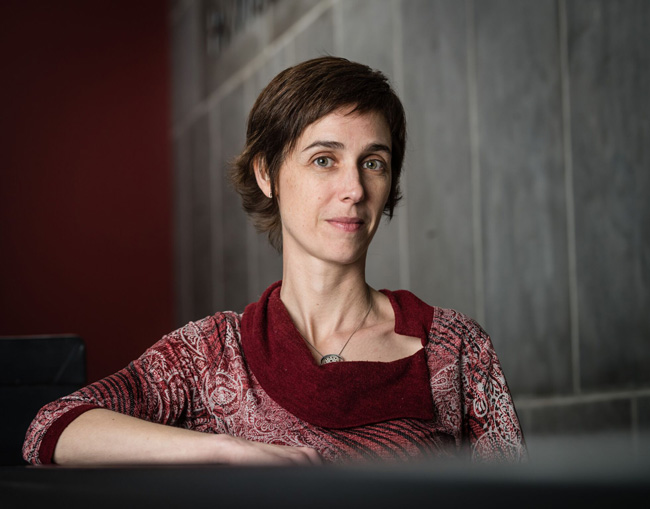
For Joëlle Pineau, becoming a medical doctor was – in her words – not in the cards. However, the Associate Professor of the McGill School of Computer Science and current Director of Facebook Artificial Intelligence Research (FAIR) Montreal, is now the driving force behind promising research emerging from McGill to improve treatment of cancer and heart disease using Artificial Intelligence (AI) models, methods and applications.
Today at Rideau Hall in Ottawa, the Natural Sciences and Engineering Research Council of Canada (NSERC) awarded Pineau one of six prestigious E.W.R Steacie Memorial Fellowships. Awarded $250,000 over two years, Steacie Fellows are relieved of teaching and administrative duties, so that they can devote time and energy to research. Pineau will continue her work as Director of FAIR Montreal.
“I am so honoured to receive the E.W.R. Steacie Memorial Fellowship,” said Pineau. “On the road to McGill’s 200th anniversary, it is my research group’s objective to harness the unimaginable potential of AI to develop solutions for unmet clinical and patient needs.”
Pineau is one of the forces behind McGill’s growing specialization in reinforcement learning (RL), a sub-discipline of machine learning concerned with building programs, which learn how to predict and act, based on experience. Among Pineau’s objectives for the fellowship include applying RL techniques to the development and improvement of personalized medical treatment strategies.
She is aiming to develop a signature mathematical construct to capture a suite of elements related to health, including an individual’s medical history, genetics, lab tests, imaging results, and history of interventions. In addition, Pineau will address questions about communicating methods and predictions discovered using RL with the medical teams operating in a clinical setting.
“We are grateful to NSERC for its support of innovative research, including Professor Pineau’s specialization in reinforcement learning,” said Martha Crago, Vice-Principal, Research and Innovation. “Congratulations to Professor Pineau on this well-deserved recognition of her contributions to AI advances in academia and industry.”
Sci-fi inventions become reality
In the space of a few years, machine learning has moved from the pages of science fiction novels, to an academic discipline pursued by a small group of dedicated researchers, to a mainstream industry, poised to solve a great number of problems where data is available. At the core of this revolution are a set of flexible, robust and powerful algorithms.
Over the last three years, Pineau has established key collaborations with colleagues in the departments of Medical Physics and Bioengineering at McGill to investigate the application of reinforcement learning techniques in the treatment of cancer. Specifically, these researchers are trying to improve adaptive radiation dosage using a combination of computational modelling, cell cultures, and animal models of carcinogenesis. Initial results of this collaborative work demonstrate faster discovery of a personalized pharmacological treatment strategy. Soon, the researchers will incorporate imaging data with the aim of having richer information about patient pathology and disease progression.
With NSERC’s continued support, Pineau’s research program has the potential to revolutionize the field of personalized medicine: changing the manner by which researchers identify the appropriate medical treatment for a patient.
Problem solving in a data-driven world
For Pineau, any idea is worth exploring, but ultimately it is the robustness and reliability of the dataset that determines the outcome. “AI solutions are about using data to expose patterns, and if the data you have is not robust to replication, it will not yield results,” she cautions. “The work of an AI researcher is in many ways like that of a financial planner. You take an honest look at the data and then plan the best way forward.”
Pineau has made a name for herself applying robotics and artificial intelligence research to real world problems, such as developing mobility assistants for the elderly and disabled. She is the founding member of two multi-disciplinary ventures developing state-of-the art personal service robots: the Nursebot platform and the SmartWheeler initiative.
Earlier in her career, she established a collaboration with researchers at the Montreal Neurological Institute (The Neuro), where she pioneered reinforcement-learning techniques to optimize neurostimulation technology to reduce epileptic seizures. In later research, she focused on developing new methods to learn adaptive pharmacological treatment strategies for mental health conditions such as depression and schizophrenia.
More recently, as the Director of FAIR, she has set to work putting Montreal on the map for AI research, offering new opportunities for attracting and retaining the brightest AI talent in Canada to the city.
While these projects make good news stories, it would be a mistake to overlook Pineau’s commitment to curiosity-driven, fundamental investigation. In her lab, two-thirds of the students work on mathematical models that are more fundamental in nature. “It is rich to have this duel research agenda, both fundamental and applied, which allows for collaborations across departments. For me, working on applied problems also helps me stay grounded in my math models, but in a more directed way.”
On May 1, 2018, the Natural Sciences and Engineering Research Council of Canada (NSERC) celebrated the winners of its six national prizes: the Synergy Awards for Innovation; NSERC Gilles Brassard Doctoral Prizes for Interdisciplinary Research; E.W.R. Steacie Memorial Fellowships; Brockhouse Canada Prize for Interdisciplinary Research in Science and Engineering; NSERC John C. Polanyi Award; and Gerhard Herzberg Canada Gold Medal for Science and Engineering. The winners were awarded at a ceremony at the Governor General of Canada’s residence, Rideau Hall, in Ottawa.
Find out more about this year’s recipients of the E.W.R. Steacie Memorial Fellowship
